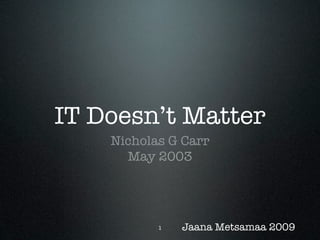It Doesnt Matter
- 1. IT DoesnˇŻt Matter Nicholas G Carr May 2003 1 Jaana Metsamaa 2009
- 2. 1970 2
- 3. 1970 2
- 4. 1970 2009 2
- 5. more power! more potential! 1970 2009 2
- 6. companies spend a lot 50% 50% .com Bubble 38% 30% 25% IT 13% 15% 5% 0% 1965 1980 1990 2000 % of money spent on IT from Capital Expenditures 3
- 7. does it matter? 4
- 8. does it matter? Does the increase of availability and potential increase its strategic value? 4
- 9. de?ciency 5
- 10. donˇŻt believe me? electricity railways (MW) (1000km 6
- 11. donˇŻt believe me? electricity railways (MW) (1000km 6
- 12. donˇŻt believe me? electricity railways computers (MW) (1000km (millions) 6
- 13. American Hospital Supply 1976 ASAP for ordering hospital goods electronically 7
- 14. a new technology might give you an advantage 8
- 15. a new technology might give you an advantage but just for a while 8
- 16. just pouring more and more $$$ into it wont give you an advantage. 9
- 17. what you should be thinking about 10
- 18. cost effectiveness 11
- 19. cost effectiveness best results arenˇŻt from companies with biggest spendings 11
- 20. follow donˇŻt lead 12
- 21. follow donˇŻt lead innovaing is expensive 12
- 22. It could kill you 13
- 23. It could kill you what if you were hacked? 13
- 24. IT matters 14
- 25. IT matters but just a lot of computers wonˇŻt give you strategic advantage 14
Editor's Notes
- \"Information technology is best understood as the latest in a series of broadly adopted technologies that have reshaped industry over the past two centuries - from the railroad to the telegraph to the electric generator. For a brief period, as they were being built into the infrastructure of commerce, all these technologies opened opportunities for forward-looking companies to gain real advantages. But as their availability increased and their cost decreased - as they became ubiquitous - they all became commodity inputs. From a strategic standpoint, they became invisible; they no longer mattered. That is exactly what is happening to information technology today, and the implications for corporate IT management are profound.\"
- Behind the change in thinking lies a simple assumption: that as IT’s potency and ubiquity have increased, so too has its strategic value. It’s a reasonable assumption, even an intuitive one. But its mistaken
- Behind the change in thinking lies a simple assumption: that as IT’s potency and ubiquity have increased, so too has its strategic value. It’s a reasonable assumption, even an intuitive one. But its mistaken
- Behind the change in thinking lies a simple assumption: that as IT’s potency and ubiquity have increased, so too has its strategic value. It’s a reasonable assumption, even an intuitive one. But its mistaken
- As IT power and presence have expanded, companies have come to view it as a resource ever more critical to their success, a fact that is clearly reflected in their spending habits.
- What makes resource truly strategic - what gives it the capacity to be the basis for a sustained competitive advantage - is not ubiquity but SCARCITY.

























